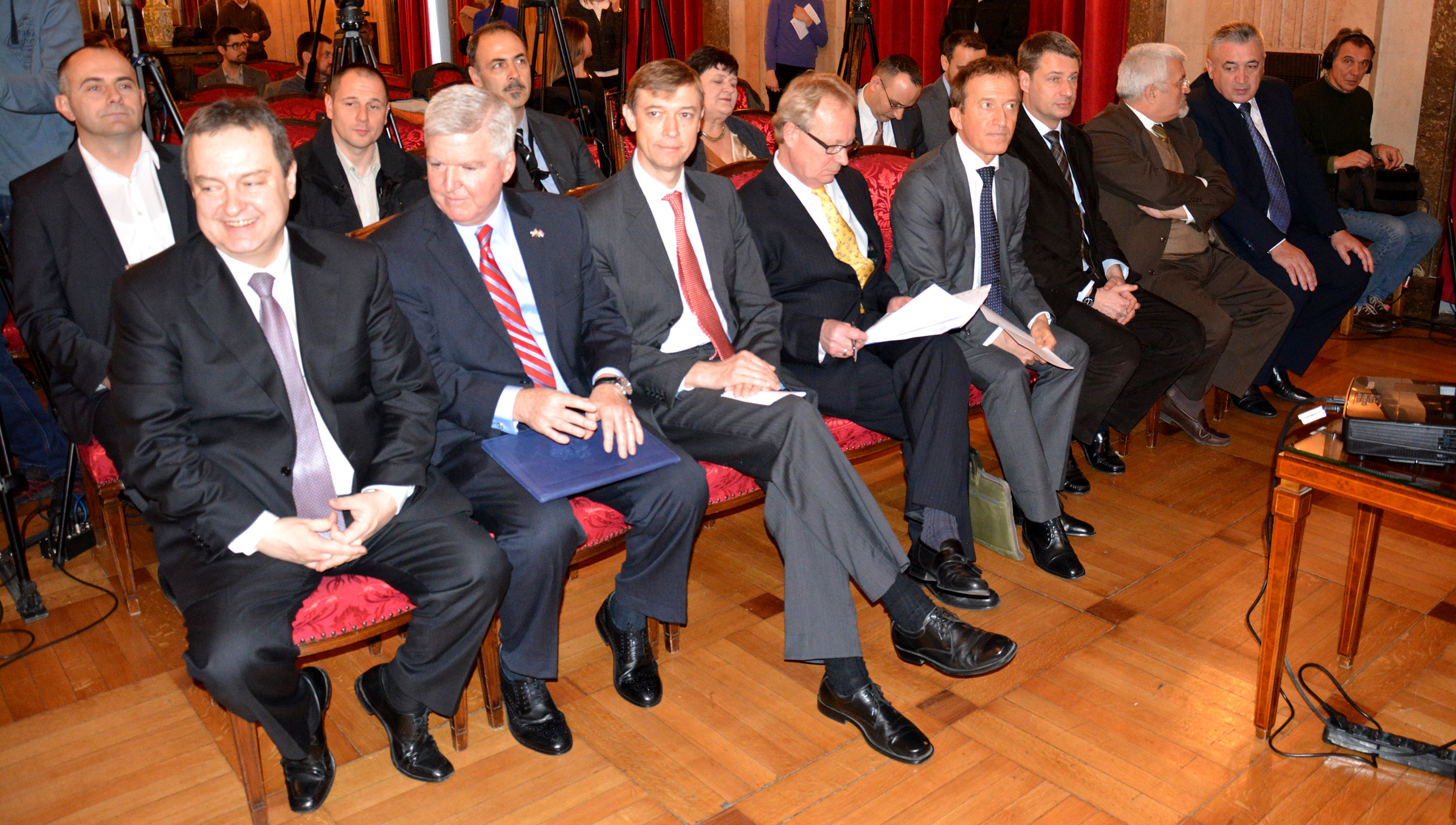



| Friday, 04 March 2016. | |
| Minister Dacic attends the signing of the agreement on building 270 flats within Serbia’s fifth RHP sub-project | |
| + larger fontnormal font- Smaller font |
 The agreement on building 270 flats in the Belgrade suburb of Kamendin was signed today in the Belgrade City Hall, as part of the Serbian fifth Regional Housing Programme sub-project. The agreement on building 270 flats in the Belgrade suburb of Kamendin was signed today in the Belgrade City Hall, as part of the Serbian fifth Regional Housing Programme sub-project.The agreement was signed by the Belgrade Mayor Sinisa Mali, Commissioner for Refugees and Migration Vladimir Cucic, and by the "PIU Research and Development Ltd Belgrade" CEO, Goran Kvrgic. The signing of the agreement was attended by First Deputy Prime Minister and Minister of Foreign Affairs Ivica Dacic, Deputy Head of the EU Delegation to Serbia Oscar Benedict, US Ambassador Kyle Scott, Head of the CoE Office in Belgrade Tim Cartwright, OSCE Ambassador Peter Burkhard, and Head of the UNHCR Office in Serbia Hans Friedrich Schodder. The investment is worth EUR 17.3 million in total, and it will provide around 1,000 housing solutions for as many refugee families. As the Regional Housing Programme's main partner, the EU donated EUR 230 million. Minister Dacic, who is also the Chair of the Serbian Government's Commission for Coordination of the Permanent Integration Process of Refugees, noted that the implementation of the Programme had finally gained momentum, and that it showed not only Serbia's political commitment to the issue, but also its capability to realise what had been agreed upon, through the cooperation of all competent authorities and institutions. While pointing out that funding had been approved for 4,153 housing solutions in Serbia, Dacic also reminded that the Programme envisaged that additional 17,000 families would get a home. "We will continue, as until now, to do everything in our power to implement this Programme in the shortest time possible," said the Serbian Head of diplomacy, adding that a long way was ahead of us in solving all refugee problems. Belgrade's Mayor Sinisa Mali stated that the Regional Housing Programme of the Republic of Serbia was of great significance for the most vulnerable families on the Belgrade territory. "The total worth of the RHP investment in the city of Belgrade is EUR 17.3 million, and it will create almost 1,000 housing solutions for as many refugee families. It is up to us to put our efforts together to deliver these housing solutions for use by beneficiaries as soon as possible," said Mali. He added that the city of Belgrade invested significant resources into the realisation of this project, like donating land and other infrastructure facilities. Deputy Head of the EU Delegation to Serbia Oscar Benedict emphasised that the European Union had been helping Serbia and the region to overcome the burden of the '90's conflicts. "We are pleased that, through two RHP sub-projects, the city of Belgrade will secure around 1,000 housing solutions for about 2,700 most vulnerable refugees," stated Benedict. US Ambassador to Serbia Kyle Scott ascertained that the construction of these refugee flats would enable them to lead a better and more dignified life. "I am impressed by the fact that the Government of Serbia and the city of Belgrade have recognised the need to help this vulnerable group, and that they showed readiness to invest their own funds to this humane cause," said Scott. The Commissioner for Refugees said that five RHP sub-projects were currently being implemented in Serbia. "At the time of the migration crisis, when the brunt of the effort is directed at people fleeing from the Middle East, we are working hard to engage all our capacities, so that the refugees from Croatia and Bosnia and Herzegovina receive adequate housing solutions, and leave the displacement period behind them. We are doing our best to complete this demanding task as soon as possible," said Commissioner Cucic. The Regional Housing Project of the Republic of Serbia is being realised with the support of the OSCE and UNHCR, and it is financed by the European Union, its biggest donor, US, Germany, Italy, Norway, Switzerland, Denmark, Turkey, Luxembourg, Cyprus, Romania, Czech Republic, Slovakia, and Hungary. |